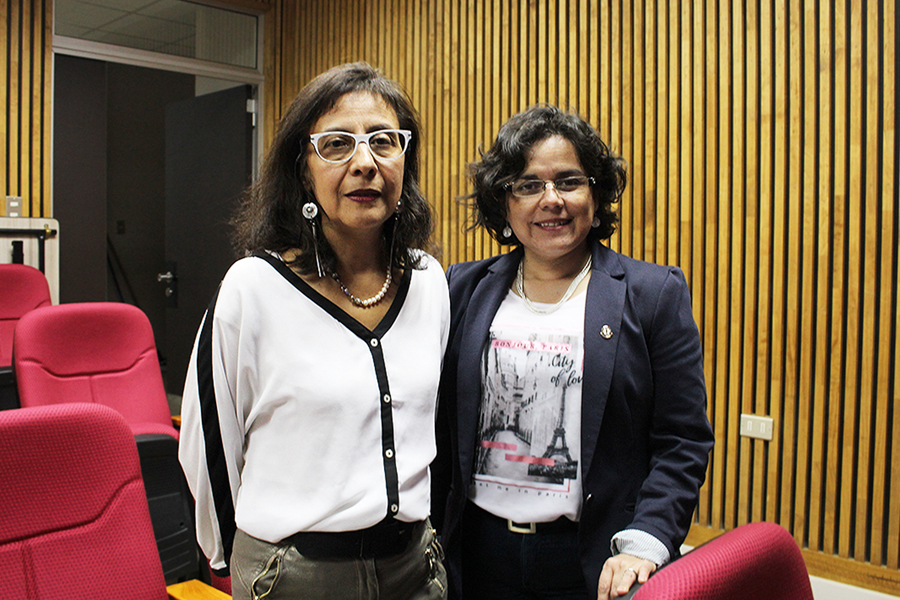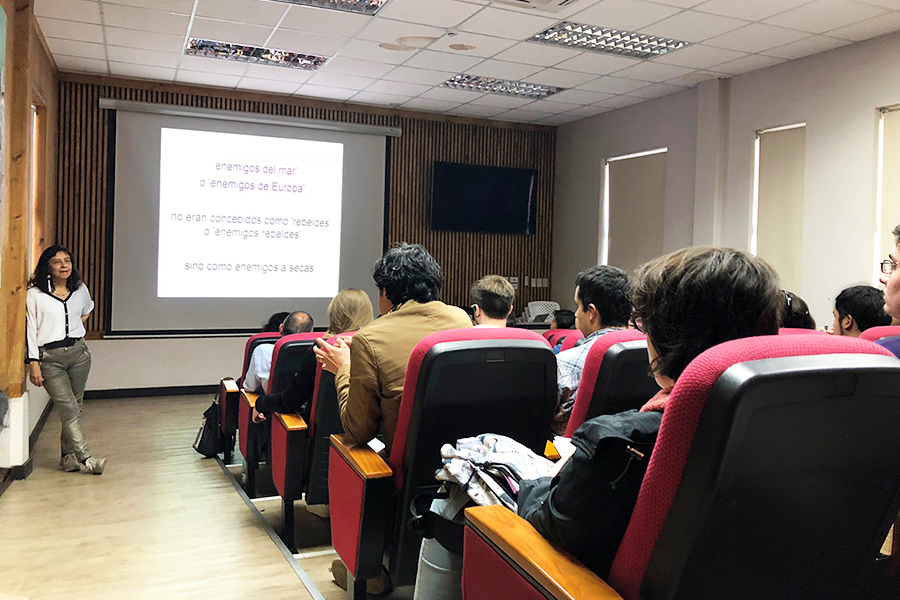|
Dr. Jimena Obregón visited the UFRO with two intentions: to participate in the 6th Cycle of Dialogue about History, and to strengthen the partnership between both universities |
Within the framework of permanent activities in the field of history, organized by the Department of Social Science at the Universidad de La Frontera, the 6th Cycle of Dialogue about History took place, addressing the issue “Power on the Margins, Frontier, People and Territories”. One of the participants was Jimena Obregón Iturra, an outstanding professor at the University of Rennes, France. She added that she studied that period of time, because it is a century she had not studied enough and pointed out: “It caught my attention because, when I started to work, this specific period of time was the one that had been studied the least and that had a lot of particularities, because it is a moment apart in itself, precisely because of the indigenous slavery that was legal in that epoch.” Yéssica González, academic at the Department of Social Science in the field of history, expressed her respect for the professor: “Professor Jimena spoke about the indigenous uprising in the 17th century, but the fundamental discussion is more profound and a question of methodology that has to do with the way we now deal with the implications that have to use certain analytical categories for the construction of historical knowledge about the region, certain episodes and phenomena.” “The interesting, the methodological, is that the academy started a discussion in the field of history and social science at the end. This has to do with rereading our research, rereading what we have been doing. We started to ask ourselves about the magnitude and the effect that has to use certain concepts or categories of language, take charge of the burden, no matter the redundancy of this discussion,” González added. History is a discipline that needs and lives with the help of others. In this regard, the professor Yessica Gónzalez pointed out: “It seems to me that, regarding the level of this discussion, a lot of other more interesting and, at the same time, more flexible and more open topics will come up; it is a way to advance with what interests us, the democratization of knowledge and the mainstreaming of this topic, because that necessarily forces you to think about how to work together.” VISIT WITH A DOUBLE PURPOSE Besides of her lecture, Dr. Jimena Obregón visited the UFRO with another purpose that has to do with the joint work between the University of Rennes and the Universidad de La Frontera: to strengthen the student exchange and the collaborative networks between these universities. “This is interesting and challenging for us, because it permits us to strengthen our networks, which is the aim we focused on lately and, on the other hand, to start thinking about how to promote this kind of exchange, especially for undergraduate and postgraduate students,” the academic added. “I am trying to organize exchanges under the name of this new institution I am working for, the University of Rennes,” Dr. Obregón explained, and added: “What I want to promote now are agreements at the postgraduate level. Everything that has to do with the internationalization of the students’ training, so we can give them the opportunity to get to see another world, to discover another educative system and to return with an expanded horizon.” ASSOCIATED PROJECTS Diufro project 2018 DI18-0058: Bad women. Violence, criminality and justice practices at the margins. Concepción (Chile) in the 19th century. Diufro project 2018 DI18-0049: History of the Southern Cone revolutionary left in the 60th and 70th from a cultural perspective. Project: I+DHAR 2012-37394-MINECO (Chilean Ministry of Economy and Business).
 Written by: Claudia Palacios Written by: Claudia PalaciosFaculty of Education, Social Science and Humanities |






